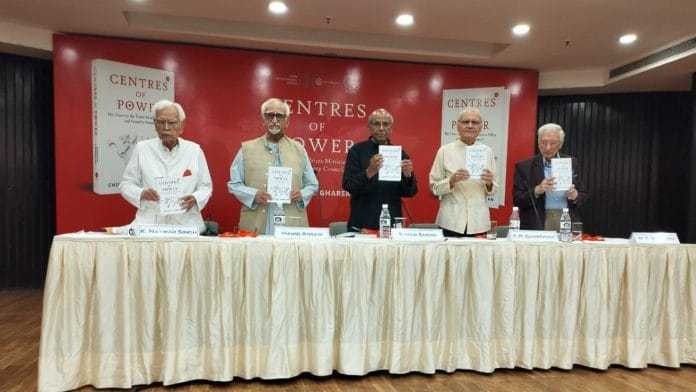New Delhi: When a distinguished member of the Indian Foreign Service decides to write about his experience of working under two Indian prime ministers — Indira Gandhi and Rajiv Gandhi — it’s sure to attract a large audience and perhaps, a little controversy too.
Last week, former diplomat Chinmaya Gharekhan launched his book Centres of Power: My Years in the Prime Minister’s Office and Security Council at the India International Centre (IIC). Published by Rupa Publications, Gharekhan’s book provides a charming yet searing account of his time in the Prime Minister’s Office from 1981-86 and then at the United Nations Security Council (UNSC) in the early 1990s.
On the panel were some of the most prominent names in Indian foreign diplomacy — former foreign secretaries Shyam Saran and MK Rasgotra, former external affairs minister K Natwar Singh, and former vice president of India, Hamid Ansari.
From describing the contrasting leadership styles of Indira and Rajiv Gandhi to dispelling misconceptions about India’s stance on the Iraq War, Gharekhan’s book provides an insider’s perspective on international politics and the workings of two political leaders who have left behind complex legacies.
There were lighter moments too. Gharekhan recalled when Indira Gandhi once asked him to check if the bottom of her saree looked alright.
“‘Mera saree thik hai kya? Peeche se unchi nahi hai?’. So, of course, I had to say something. ‘Haan, left side se thoda unchi hai’,” said the author, who was met with laughs and cheers from the audience.
Speaking to ThePrint, 51-year-old Manish Agarwal, a practising chartered engineer who attended the book launch, said he couldn’t help but note the current context in which the book has been published.
“It’s an interesting time for this book to come out because the current government doesn’t really heap praise on Mrs Gandhi. As a layman, we usually see such people as caricatures. This book provides some insight into who she was as a person and a boss, while also acknowledging her glaring flaws,” he said.
The book was incidentally launched just days before Rajiv Gandhi’s death anniversary on 21 May.
Also Read: Focus on services an excuse for incompetence. Manufacturing is key, says Jaishankar
‘Privy to many top secrets’
As attested by his fellow panellists, Gharekhan provides a wealth of knowledge on how Indira Gandhi faced pressure in the lead-up to the armed action at the Golden Temple in June 1984, as well as the difficulties of negotiating complex, global agreements at the UN.
“I’m sure there are some things in the book which may not go down well with some people, including two of the gentlemen who are present here [on the panel],” said Gharekhan, sending laughs across the room. Singh and Rasgotra didn’t seem amused.
The author was right.
When Rasgotra offered his remarks, he first praised the book for providing special insights into Indian political decision-making at the national level and even referred to the author as “the only sensible man in the UN Security Council” during the Gulf War.
But he appeared unhappy with one line.
“Somewhere you say that post a visit of Prime Minister [Indira Gandhi] to New York — you said from this particular journey, the Prime Minister excluded “even” Rasgotra. My friend, you think at that age I was a nanny boy who wanted to sit on her lap all the time?” asked Rasgotra, causing many in the audience to exchange glances.
He explained that he was sent to New York in advance to carry out some meetings.
Singh, while noting that the author was “privy to many top secrets”, revealed that Gharekhan was at one point worried he wouldn’t find a publisher for the book.
Parts of the book also deal with misconceptions about India being a “friend” to former Iraq President Saddam Hussain during the first Gulf War.
The author revealed what many may have forgotten — that Iraq was the first Arab country to recognise Bangladesh as an independent state.
(Edited by Theres Sudeep)






